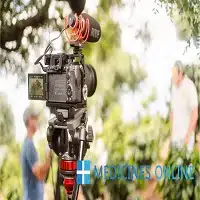
For making captivating documentaries and adventure films, remote wilderness is the ideal location that can give the recommended attractiveness. Many blockbuster movies in the past have proved that the backcountry is also a popular choice among audiences. But success comes with struggle, and the struggle of filming in the wilderness is real. Those areas are mostly lonely, without even common necessities of life. Finding health care in those areas is ineffective. Thus, it is a good idea to carry a proper first-aid kit that contains every common medical care item, such as an STD Home Kit.
Moreover, a home testing kit will add an extra benefit to your first-aid box through which you can check your disease status. It would be an intelligent behaviour if you carried a CBC blood testing kit with you. Additionally, taking an STD Home kit can also help to prevent the threat of other sexual infections.
No doubt, filming in nature will give a film the most perfect and organic look. It also reduces the expense of special effects and CGI, as nature’s mountains, flora, and fauna speak louder than any artificial effects. But, the hazardous products in these areas can’t be avoided. Thorough preparation is necessary before deciding to shoot in between the woods. This article lets you know the requirements of shooting in the remote wilderness.
What are the Remote Wilderness Locations?
Wilderness or wildlands refers to the natural environments on the earth that have not been changed or modified by human activity and are in their natural state. The remoteness adds an extra attraction to nature and lets the public experience the real wilderness. Filmmakers are turning to nature to make their movies, and many wilderness locations have been used to make many films.
Make a Hunt for a Perfect Location
There are various remote wilderness locations worldwide. Choosing the best-suited location for your film would be easy by doing a simple STD Google search about the type of wilderness you want. Orford Ness, Suffolk, is one of the very famous wilderness locations in the United Kingdom, also known as the end-of-the-world shingle desert.
But, it is essential to remember that various points are necessary to keep in mind before entering into these types of locations, and those points are:
- Permission: First, gather the information about whether you’ll get permission to shoot in that area.
- Cost: Some locations will cost the film team a premium. So, discussing the charges before finalizing the site would be better.
- Logistics: It is not at all easy to access remote wilderness areas. Therefore, pre-discussion and practice will be helpful before deciding to shoot in these areas.
Prepare for the Worst
Filming in these areas is difficult, and every film encounters logistical challenges or major setbacks during the shooting phase. There are various odds in working under the shade of these workings due to unpredictable weather conditions, lack of proper electricity, absence of a CBC healthcare system, animal threats, and more. Preparing to face all these challenges before entering these lands is necessary to overcome them.
To tackle the harsh conditions of remote wilderness, one can make the following preparations:
- Bring enough spare equipment and waterproof gear in case of heavy rainfall or deluge.
- Bring high traction flooring and grit to ensure the safety of everyone at the shoot location.
- Prepare umbrellas and tents to safeguard from heavy rainfall during the shoot timing.
- Bring ropes and wire as the wind of wilderness might be very fast, and you could need to tie up things to avoid the loss.
- Bring a CBC Blood testing kit to check the health status of your crew member. A complete blood count will help assess the crew members’ infection status and give many other benefits.
- STD Home kits will also be helpful for sexually hyperactive people who can’t control themselves anywhere. Moreover, sexual infections are contagious and can spread via contact with the infected area. To stop this outbreak at your set location, use these kits, which Medicine Online provides via their online website.
Manage Your Stress Level on the Set
Working in a challenging environment can be stressful, especially when no sense of a CBC healthcare system exists. Health conditions are the most important factor of stress and tension; in places like remote wilderness, this tension can increase to the worst. But there is no need to get upset or panic as every problem has its solution. Healthcare stress at remote wilderness locations can be solved using monitoring kits. These kits will allow the public to stay active about their health. Adding CBC Blood kits will empower you with the overall health conditions of your crew.
This will help you stay tension-free from the healthcare stress. Moreover, a healthy brain works more healthily and gives perfect outcomes. Thus, remember to put screening kits in your preparations to stay stress-free, healthy, and active. Additionally, don’t forget to rest properly and sleep during the filming days, eat a balanced diet for a healthy body, vacate some time to meditate, stay hydrated, and remember your loved ones.
Conclusion
Filmmaking is an exciting task, but if we talk about filming in the remote wilderness, then with thrilling, it also creates several challenges. The most challenging thing is to tackle the problems of the local CBC healthcare system. But with the help of home testing kits, accessing health care has been easier than ever. So, the next time, don’t forget to take the STD Home testing kit with you. Moreover, remember to add a CBC test kit to assess overall health. When you make a full profile STD Exam with either the 8 or the 10 tests, you have the complete Health Data to make decisions.
